Filter by

A New Paradigm for International Business: Proceedings of the Conference on F…
This book offers a collection of studies on regional integration and the dynamic business environment in East Asia. The papers included, originally presented at the 2014 Asia Pacific Business Conference on "Free Trade Agreements and Regional Integration in East Asia," examine the challenges and dynamics in the increasingly integrated East Asian markets and outline a new paradigm for doing inter…
- Edition
- Ed. 1
- ISBN/ISSN
- 978-981-287-499-3
- Collation
- -
- Series Title
- Springer Proceedings in Business and Economics
- Call Number
- 338.9 NEW n
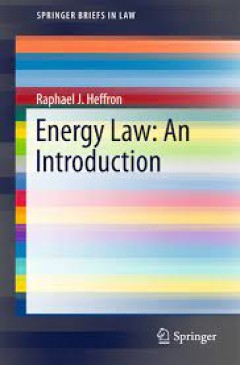
Energy Law: An Introduction
The aim of this short text is simply to introduce a reader to this topic. It is intended for a global audience and rather than being restricted to potential energy law students of a particular country. It is also written for students of other disciplines such as geographers, social scientists and engineers. It should also be engaging to those in a variety of professional practices who want an a…
- Edition
- -
- ISBN/ISSN
- 978-3-319-14191-6
- Collation
- 1 b/w illustrations, 1 illustrations in colour
- Series Title
- -
- Call Number
- -

Energy Law in Brazil Oil, Gas and Biofuels
This book describes the energy-law situation in Brazil. It focuses on three specific energy sectors: oil, natural gas and biofuel. The decision to concentrate on these areas takes into account the role that these energy sectors play in the economic, political and legal systems in Brazil, as well as the fact that they are the primary subjects of current discussions surrounding economic regulatio…
- Edition
- -
- ISBN/ISSN
- 978-3-319-14268-5
- Collation
- 2 b/w illustrations, 3 illustrations in colour
- Series Title
- -
- Call Number
- -

Emerging Issues in Sustainable Development International Trade Law and Polic…
This book seeks to answer the questions: how do the rules of international treaties on trade and investment apply to the new laws and policies relating to energy-related trade, and do the rules of the multilateral system contribute to or detract from sustainable development? An emerging set of new problems in the law of international trade is how to reconcile the rules of the multilateral trad…
- Edition
- -
- ISBN/ISSN
- 978-4-431-56426-3
- Collation
- 1 b/w illustrations, 2 illustrations in colour
- Series Title
- -
- Call Number
- -
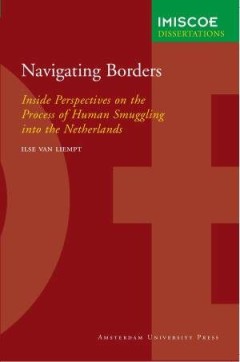
Navigating Borders: Inside Perspectives on the Process of Human Smuggling int…
Navigating Borders into the Netherlands provides a unique in-depth look at human smuggling processes. Based on biographical interviews with smuggled migrants in the Netherlands, the study reveals considerable differences that exist in smuggling's underlying causes, how journeys evolve, and outcomes of the process. This research from an insider's perspective clearly demonstrates that smuggled mi…
- Edition
- -
- ISBN/ISSN
- 9789053569306
- Collation
- -
- Series Title
- -
- Call Number
- 306.74 LIE n
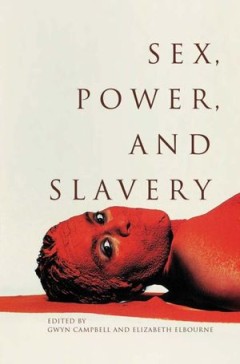
Sex, Power, and Slavery
Sexual exploitation was and is a critical feature of enslavement. Across many different societies, slaves were considered to own neither their bodies nor their children, even if many struggled to resist. At the same time, paradoxes abound: for example, in some societies to bear the children of a master was a potential route to manumission for some women. Sex, Power, and Slavery is the first his…
- Edition
- -
- ISBN/ISSN
- 9780821420966
- Collation
- -
- Series Title
- -
- Call Number
- 909 SEX s
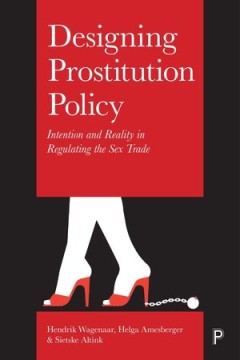
Designing Prostitution Policy : Intention and Reality in Regulating the Sex T…
While the debate on regulating prostitution usually focuses on national policy, it is local policy measures that have the most impact on the ground. This book is the first to offer a detailed analysis of the design and implementation of prostitution policy at the local level and carefully situates local policy practices in national policy making and transnational trends in labour migration and …
- Edition
- -
- ISBN/ISSN
- 9781447324249
- Collation
- -
- Series Title
- -
- Call Number
- -
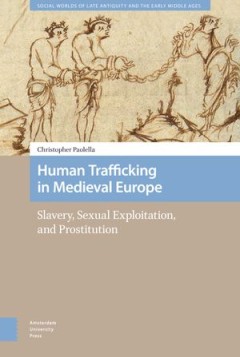
Human Trafficking in Medieval Europe Slavery, Sexual Exploitation, and Prost…
Human trafficking has become a global concern over the last twenty years, but its violence has terrorized and traumatized its victims and survivors for millennia. This study examines the deep history of human trafficking from Late Antiquity to the Early Modern Period. It traces the evolution of trafficking patterns: the growth and decline of trafficking routes, the everchanging relationships be…
- Edition
- -
- ISBN/ISSN
- 9789463723336
- Collation
- -
- Series Title
- -
- Call Number
- -
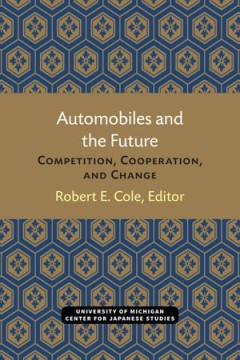
Automobiles and the Future : Competition, Cooperation, and Change
At the time of the U.S.-Japan auto conferences in March 1983, the hoped-for economic recovery as manifested in auto sales had revealed itself quite modestly. Three months later, the indicators were more robust and certainly long overdue for those whose livelihood depends on the health of the industry--some of whom are university professors. With Japanese import restrictions in place until Ma…
- Edition
- -
- ISBN/ISSN
- 9780472902088
- Collation
- -
- Series Title
- Michigan papers in Japanese studies no. 10
- Call Number
- 338.476 AUT

Basic HVAC
This readily accessible online introductory resource was developed for anyone who has interest in, or works with, HVAC controls and equipment.
- Edition
- -
- ISBN/ISSN
- 978-1-77420-099-5
- Collation
- -
- Series Title
- -
- Call Number
- 621.3
 Computer Science, Information & General Works
Computer Science, Information & General Works  Philosophy & Psychology
Philosophy & Psychology  Religion
Religion  Social Sciences
Social Sciences  Language
Language  Pure Science
Pure Science  Applied Sciences
Applied Sciences  Art & Recreation
Art & Recreation  Literature
Literature  History & Geography
History & Geography